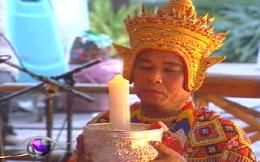The Manora dance is popular among Southern locals and is a part of their cultural identity.
The folk beliefs of Manora dance are a combination between Buddhism-Bhraminism and animism, while the traditional performance is considered as geniune cultural heritage and entertainment.
It also serves locals’ social needs in terms of ancestor worship and by acting as spiritual refuge, helping solve physical and spiritual obstacles faced by individuals.

Performances usually start on Wednesday evening and last until Thursday or Friday.
The steps taken in the rituals begin with the process of paying respect to the Manora teachers and inviting deceased ancestors to enjoy the dance before it begins. The second day is dedicated to perform offerings to the Manora teachers, fulfilling vows and sending off the teachers.
The sacredness of the rituals affects individuals in almost every aspect of life from social behavioral control to finding jobs.
“If your children are taking exams to enter a university, you can bring them to my place to make a vow. Once the vow becomes official, you can offer the Manora teachers a Manora dance.

“The performance will be done here in accordance with the offering that you promised to the Manora teachers,” said Sompongnoi Dowrung, a Manora performer from Phatthalung province.
At present, Manora Dance is registered as one of Thailand’s 50 cultural heritage types, the same as Thai classical masked drama, the northeastern-style singing, and the grand shadow play.
Southern locals, meanwhile, are promoting and preserving this folk belief and entertainment among newer generations.

“Training of Manora Dance among students in schools for the past 3-4 years has been quite serious. I think in 20 years time, these students will be able to take the dance as their main career or as a part-time job,” said Asst Prof Saroj Nakaviroj, Songkhla Rajabhat University’s visiting lecturer.
To ensure that the Manora dance is preserved as a national heritage, Thai authorities on cultural matters are speeding up the registration of the performance to be listed by United Nations Educational, Scientific, and Cultural Organization (UNESCO)’s Convention for the Safeguarding of Intangible Cultural Heritage.




